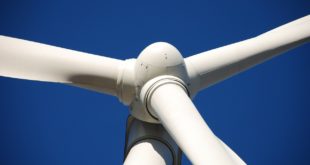Typical Wind Farm Supports Nearly 1,100 Jobs; Adds Millions of Dollars to Local Communities
Congressional Inaction on Production Tax Credit Threatens to Stop Major Boost for Employment
Each major wind farm in America creates nearly 1,100 jobs and can add tens of millions of dollars in new taxes and other benefits to the communities where they’re located, according to two new reports from the Natural Resources Defense Council.
A new 250-megawatt wind farm will create 1,079 jobs throughout the many steps of building that wind farm, according to the NRDC report “American Wind Farms: Breaking Down the Benefits from Planning to Production.” These are positions in manufacturing, construction engineering and management, among other areas.
But the benefits don’t end there, a separate NRDC study on the secondary impacts of the wind energy industry shows.
Wind farms also are helping revitalize communities across the country by generating new taxes, lease payments to landowners and economic development revenues, in addition to creating new job opportunities, the NRDC report “At Wind Speed: How the U.S. Wind Industry is Rapidly Growing Our Local Economies,” shows. The report profiles four communities from Ohio to Oregon that have benefitted from the wind industry.
Today, wind farms generate about 50,000 megawatts of clean, renewable energy – the equivalent of the energy produced by 12 Hoover Dams – and the wind industry employs about 75,000 Americans. Wind energy production has increased by more than 170 percent in the past four years alone.
Yet the industry’s growth and promise is now facing potential disaster, because Congress has not renewed the 2.2-cent per kilowatt hour Production Tax Credit (PTC) that’s set to expire at the end of the year. The Senate is expected to take up the PTC as early as this week.
NRDC policy advocate Cai Steger, co-author of the report, said: “Every time a wind farm gets built, American jobs are created. These reports show what the PTC has done for the wind industry – and why it’s essential that it is extended.”
Colorado Sen. Michael Bennet, who is leading efforts in the Senate to extend the PTC, said: “The case is clear. The wind energy industry supports jobs and drives economic development. It’s time for Congress to make extending the bi-partisan wind PTC a top priority.
“In Colorado and across the country, workers are already paying the price for Congressional inaction on the PTC,” Sen. Bennet said. “Those jobs losses are only a glimpse of what could happen if we let the tax credit expire.”
Ohio Sen. Sherrod Brown, who also is leading efforts in the Senate to extend the PTC said: “As the Natural Resources Defense Council’s report demonstrates, wind energy has the potential to bring thousands of new manufacturing jobs to Ohio and the United States.
“Ohio and the United States are poised to lead the world in wind turbine manufacturing and use”, Sen. Brown said. “We can’t trade a dependence on foreign oil for a dependence on foreign-made clean energy components, which is why supporting American manufacturers of wind turbines and parts is more important than ever.”
According to the NRDC supply chain report, the 1,079 jobs created by a typical 250 MW wind farm are created at 14 different steps along the way of building the wind farm.
Non-construction businesses account for an estimated 557 jobs. They include 432 workers in manufacturing, 80 in planning and development, 18 in sales and distribution and 27 in operations and maintenance.
Construction jobs add another 522 jobs to a typical wind farm. These workers are spread between three categories, with 273 working on on-site civil works, such as roads, and foundations; 202 working on the installation of the wind turbines and 47 working on on-site electrical work, such as grid connection.
Additionally, the report profiles American companies that could participate at every one of the 14 steps of the wind farm.
The reports can be found here: http://www.nrdc.org/energy/american-wind-farms.asp and here: http://www.nrdc.org/energy/wind-powered-communities/
 Alternative Energy HQ solar power for homes, wind energy, and bio fuel issues
Alternative Energy HQ solar power for homes, wind energy, and bio fuel issues






